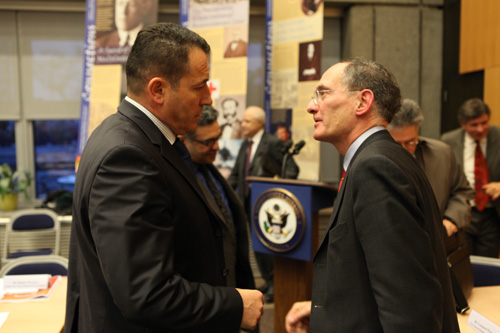The Global Challenges Initiative
Today it is widely accepted that in addition to “traditional” global challenges such as wars between states, nuclear proliferation, etc. a whole host of new issues are emerging which pose significant threats to global peace and stability. This development necessitates a new “toolbox” of policies and approaches to complement existing ones.
Brief History –
The Global Challenges Initiative, also referred to as GCI, started in 2010 with the official launch of the inaugural Global Challenges Forum Conference. The Global Challenges Initiative is composed of three separate activities, which are established in association with each other, two of these being legal entities: the Global Challenges Forum Foundation (GCFF) and the Association for Strategic Research and Action Geneva (ASRAGENEVA), and the third being a book series in association with the State University of New York (SUNY): “The SUNY Series on Global Challenges in the Twenty-First Century”.
The 2009 Global Challenges Roundtable
On 21-23 September 2009, the Centre for International Governance of the Graduate Institute hosted a roundtable on “Global Security Challenges.” This event was held at the U.S. Mission in Geneva. It was an initiative of the U.S. Naval Postgraduate School and prominent research organizations from the USA, Europe, the Middle East and Asia. It was intended to explore some of the existing applied policy research on security challenges and threats and to facilitate the exchange of multidisciplinary experiences at the interface of globalization.
The event was attended by more than 60 civilian as well as military experts as well as by stakeholders from the Geneva international community, China, Jordan, Singapore, Switzerland, the United Arab Emirates, the United Kingdom and the United States. The roundtable was organized around a series of sessions; each dealt with a different challenge and risk profile. Topics included energy ; human ; economic ; cyber security and critical infrastructure; and emerging global issues. In each session participants were asked to consider security-related issues from global and regional perspectives; discuss the driving forces behind the different issues and their impacts; and examine possible options for multilateral policy initiatives aimed at ensuring better management of emerging threats.
The 2010 Global Challenges Initiative
The 2010 GCI was built upon the questions and recommendations of the 2009 Roundtable, focusing on the global economy. Participants examined the changes of the past decade, and sought to explore the complexities of economic shift, development, and the rise of new economic powers. Discussion focused on exploring two broad but increasingly interrelated topic areas – Economics and Security. As national economies and security sectors become more connected, it will become more difficult to address problems on a state by state basis. An approach that integrates the positions of nation-states, corporations, non-governmental organizations, international organizations, and private citizens is the only way of solving new global problems.
On November 17 2010, the Global Challenges Initiative was officially launched; the culmination of two days of intensive discussions and presentations in Geneva, Switzerland. Hosted jointly by the Naval Postgraduate School, the University of Geneva, and the Talal Abu Ghazaleh Business University at the U.S. Mission in Geneva, it was the first official forum to be conducted after the 2009 Global Challenges Roundtable proposed the establishment of such an endeavor. Focused on shaping the organization in response to emerging issues of related topics, the forum set an ambitious agenda for the coming years.
The 2011 Transformative Education Forum
Throughout 2011, the Global Challenges Initiative focused most of its efforts on organization building and planning. But in parallel to such activities, it also organized the first official Transformative Education Forum (TEF), after a inaugural TEF Planning Meeting in 2010. The 2011 TEF took place in Monterey CA, USA.
The 2012 Legal Establishment and Book Series
After relentless efforts in 2o11, the Global Challenges Initiative has legally established under its auspices two non-profit institutions, the Global Challenges Forum Foundation (GCFF) and the Association for Strategic Research and Action Geneva (ASRAGENEVA), both of which are registered under the Canton of Geneva, Switzerland. These institutions were established in association with each other as the means through which the GCI shall achieve its mission, having the GCFF as its structural basis and ASRAGENEVA as its membership arm. In addition, the Initiative has also launched in 2012, a book series in partnership with the State University of New York (SUNY) Global Center, "The SUNY Series on Global Challenges in the Twenty-first Century". For more information please click on the links below.
Global Challenges Forum Foundation
Association for Strategic Research and Action Geneva
The SUNY Series on Global Challenges in the Twenty-first Century
The 2013 Sustainable Development Forum - GILPP
The Global Challenges Forum established a partnership with Global Hope Network International and joined forces in the implementation of The Geneva Institute for Leadership and Public Policy (GILPP). GILPP is one of the active Forums within the GCF "Forum of Forums" concept. It was established by GHNI to help leaders transform their nations toward prosperity and liberty. The vision for the GILPP is to promote public policy created by enlightened and compassionate public leadership in support of sustainable development . The principal international initiative of this institute is to offer an intensive week-long summer workshop in Geneva, Switzerland on critical contemporary global and national issues.
GILPP uses an integrated curriculum which elicits sustainable development in chaotic times targeting global challenges and solutions in four strategic areas:- Leadership—leading by influence
- Economics—globalization and leadership
- Public Policy—good governance
- Culture—Worldview and Models of culture
http://globalhopenetwork.org/leadership/geneva-institute-for-leadership-and-public-policy
